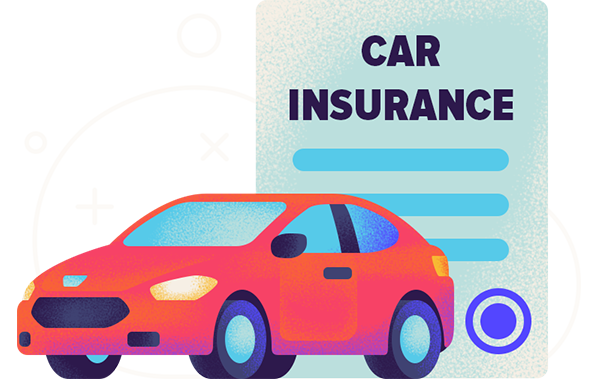What Is Non-Owner Car Insurance?
Non-owner car insurance is coverage for drivers who don’t own a car but drive regularly using rental cars, car sharing services, or borrowed vehicles. Drivers are eligible for non-owner insurance if they have a valid driver’s license and do not own a vehicle. Many insurers will not write a non-owner policy if a driver has access to a vehicle in their household.
Key Things to Know About Non-Owner Car Insurance
- Non-owner policies provide the minimum coverage required by the state, as well as some optional add-ons.
- Most major insurers offer non-owner car insurance.
- Non-owner car insurance costs between $200 and $500 per year.
- Consider getting non-owner car insurance if you don’t own a car but plan to frequently rent or borrow one.
How Does Non-Owner Car Insurance Work?
Non-owner car insurance provides liability coverage to people who don’t own a car. Like standard liability insurance, it covers car damage and injuries to other people when you are at fault, but it will not cover your own injuries or damage that occurs to the vehicle you are driving.
Non-owner insurance policies include any state-mandated types of coverage and usually allow drivers to add optional types of coverage, such as uninsured/underinsured motorist and personal injury protection (PIP). Since non-owner insurance policies don’t cover a specific vehicle, they do not include collision or comprehensive coverage.
Learn more about how non-owner car insurance works.
What Does Non-Owner Car Insurance Cover?
Non-owner car insurance usually provides the same level of protection as a standard car insurance policy. A non-owner insurance policy will cover you for:
- Injuries to other drivers in accidents that you cause
- Property damage, excluding damage to the vehicle you’re driving
- Accidents caused by uninsured/underinsured motorists
- Medical bills resulting from accidents
Learn more about what non-owner car insurance covers.
Best Non-Owner Car Insurance Companies
| Company | Phone Number | WalletHub Editor's Rating |
|---|---|---|
| GEICO | 800-207-7847 | 4.4/5 |
| USAA* | 800-292-8045 | 3.5/5 |
| Progressive | 800-776-4737 | 3.9/5 |
| Mercury | 800-956-3728 | 3.7/5 |
| Travelers | 866-662-1921 | 4.2/5 |
*USAA is only available to military service members and their families
Most national insurance companies offer non-owner car insurance policies. However, they will generally only provide quotes over the phone, and Progressive only offers non-owner car insurance to existing customers.
Learn more about the best non-owner car insurance companies.
Other Companies That Offer Non Owner Car Insurance
- Nationwide
- State Farm
- Allstate
- Liberty Mutual
- Farmers
- American Family
- Mercury
- Acceptance Insurance
- Dairyland
- Direct Auto
- The General
Non-Owner Car Insurance for Businesses
A business can’t purchase a typical non-owner car insurance policy because it is a special type of car insurance meant specifically for personal use by individuals who do not own vehicles. If you are looking to purchase non-owner car insurance because your business rents vehicles, there are alternatives available. Alternate forms of non-owner insurance are also available to protect you from any resulting damages when your employees use their personal cars for work-related reasons.
- Hired and non-owned auto insurance (HNOA). Hired and non-owned auto insurance protects the business when employees use personal vehicles for work-related reasons or when an employee rents a vehicle for company use. HNOA provides liability coverage for any injuries or property damage caused by the employee while driving a rented or personal vehicle for work purposes.
- Commercial umbrella insurance. Commercial umbrella insurance provides additional liability coverage beyond the limits of the primary insurance policy. It can be added to commercial auto insurance or hired and non-owned auto insurance to increase the coverage limit.
- Rental car insurance. If your business is renting a vehicle and does not wish to purchase HNOA, a good way to protect your business against any incidents involving the rental vehicle is to purchase rental car insurance. You can get rental car insurance using a business credit card, your commercial auto insurance, or from the rental car company itself.
- Personal auto policy with a business-use endorsement. With a business-use endorsement, your personal auto insurance may provide coverage when the vehicle is used for business purposes. For example, Farmers may allow you to use your personal car insurance for things like business errands and travel if you have a business-use endorsement. However, it’s important to review your policy to determine if it covers business use and the extent of the coverage.
How Much Is Non-Owner Car Insurance?
Non-owner car insurance costs between $200 and $500 annually. Since drivers with non-owner insurance aren’t on the road as much as the average policyholder, they’re less likely to file a claim and pay less for coverage as a result.
The amount of coverage you choose, your driving history, your location, and your driving frequency will help determine the exact cost of your policy. Non-owner insurance policies do not have a deductible.
Learn more about how much non-owner car insurance costs.
When to Consider Non-Owner Car Insurance
1. You’re seeking to get your license reinstated after a serious infraction.
If your license is suspended after you are convicted of a DUI or other serious traffic offense, state laws will require you to file an SR-22 or an FR-44 to get your license reinstated. As part of this process, you will have to certify that you have purchased car insurance. If you do not own a car, purchasing a non-owner insurance policy will meet state requirements. Non-owner car insurance is typically cheaper than traditional car insurance.
2. You frequently rent cars.
Most states require car rental companies to provide the state minimum levels of liability insurance as part of the basic rental fee. But in many cases those state minimums cover very little, and some states like California do not require rental companies to provide liability protection.
You can buy additional liability insurance at the rental counter, but this coverage will cost you $10-16/day. So if you rent cars more than a few times a year and you want more than the minimum level of liability coverage, your own non-owner policy may be the most affordable option.
Paying with a credit card provides you with coverage for damage to the rental car, but bank cards provide no liability insurance protection.
3. You frequently use car sharing services.
Car sharing companies include some level of liability coverage as part of the rental fee. Zipcar, for example, provides members who joined after July 2018 with the minimum amount of coverage required by their state. But you’re responsible for a $1,000 “damage fee” before this coverage kicks in.
Car sharing services generally offer extra coverage or reduced deductibles for an additional annual fee – Zipcar’s “damage fee waiver” is $79/year, for example. With a non-owner insurance policy, however, you’re automatically covered when you drive any vehicle, including those rented through car sharing services.
4. You are borrowing a car from a friend or family member.
When you drive someone else’s car, expenses from an accident will generally be covered under the owner’s insurance policy. But then the car’s owner is choosing the level of coverage, not you. And if there are problems with claims, you’re not the insurance company’s customer. Under your own policy, you can be certain you have adequate liability coverage.
5. You’re temporarily between cars.
If you’re car-free in the near term but plan to buy a car soon, a non-owner insurance policy is an inexpensive way to maintain continuous coverage and long-term customer status. It will also provide you coverage as you are test-driving vehicles. When you do buy a car, you will need to inform your insurer immediately and switch to an owner’s policy.
When Not to Use Non-Owner Insurance
Non-owner car insurance is not right for people who:
- Live with someone who owns a car, as most companies will not allow you to purchase a non-owner policy in this situation.
- Use public transit or ridesharing services instead of driving.
- Only drive when using rental cars a handful of times per year, in which case rental car insurance would be a better plan.
- Do not plan to ever own a car.
Learn more about who should not get non-owner insurance.
How to Get Non-Owner Car Insurance
- Compare quotes from different companies. You should compare quotes from at least three different insurance companies before purchasing a non-owner car insurance policy to ensure that you are getting the best rate possible. You can start by comparing quotes from our picks for the best non-owner car insurance companies. You will likely have to call each company to get a quote, since most insurers do not offer online quotes for non-owner insurance.
- Prepare the necessary information. When you go to purchase a non-owner car insurance policy, the insurance representative will likely ask for your name, date of birth, phone number, address, and occupation. They will also ask for details about your previous insurance coverage.
- Choose how to pay your premium. When you officially purchase your policy, you can choose how often to pay your premium and how often to renew your policy. Typically, drivers purchase six months or a year’s worth of coverage, but they can opt to pay in monthly installments. However, it may be cheaper to pay for your policy in full up front since many insurance companies offer a pay-in-full discount.
Learn more about how to get non-owner car insurance.
Video: Understand Non-Owner Car Insurance
Ask the Experts
To gain more insight about non-owner car insurance, WalletHub posed the following questions to a panel of experts. Click on the experts below to view their bios and answers.
1. What kind of drivers should consider non-owner car insurance?
2. What kind of drivers should not consider non-owner car insurance?
3. What is the biggest advantage of a non-owner car insurance policy?
Ask the Experts
– Ph.D., Assistant Professor of Marketing, The Business School, Worcester Polytechnic Institute
Read More
Ph.D. – Associate Professor, College of Business and Management – Lynn University
Read More
CFP®, Adjunct Faculty, Florida Southern College, Barney Barnett School of Business and Free Enterprise
Read More
Adjunct Professor of Finance, School of Business, George Mason University
Read More
Ph.D., Associate Professor of Economics, Gordon Ford College of Business, Western Kentucky University
Read More
Adjunct Professor of Business, The King's College
Read More








WalletHub experts are widely quoted. Contact our media team to schedule an interview.